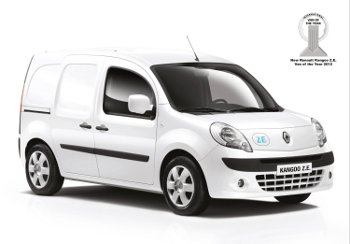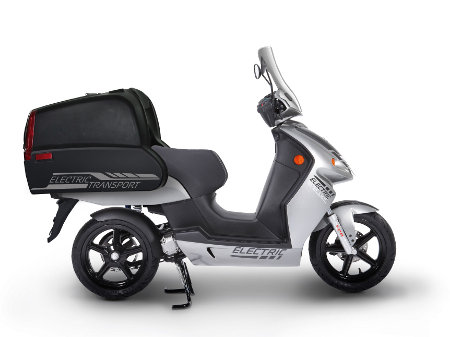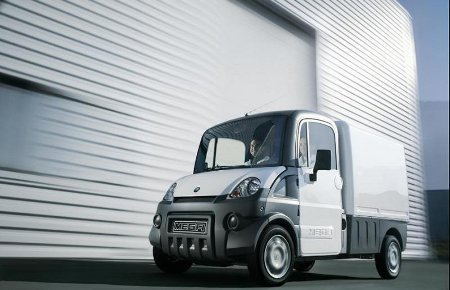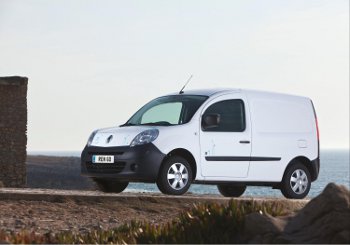
The Kangoo Van Z.E. looks the same as any other Kangoo
Back in February I blogged about the forthcoming launch of the Renault Kangoo Van Z.E. – the electric Kangoo.
That hour has now arrived (almost) and the Kangoo Van Z.E. goes on sale in the UK in November. Externally it looks virtually identical to the standard Kangoo and this electric model will be available in most of the same configurations, too:
- Two and five-seat versions
- Maxi long wheelbase model
- 650kg payload
- Load capacity of up to 4.6 cubic metres
The Kangoo Van Z.E. will use lithium ion batteries which are relatively lightweight and do not suffer from ‘memory’ problems. This means that they can be partially charged and discharged without any concerns over a loss of battery capacity, unlike older types of rechargeable battery.
Most people are pleasantly surprised when they first drive an electric vehicle. Maximum torque is available almost from a standstill, giving a responsive drive. Electric vehicles don’t have manual gearboxes either – they have seamless ‘reducer’ transmission systems that are fully automatic – just select forward or reverse.
The Kangoo Van Z.E. has a 44kW electric motor (equivalent to 60hp) that delivers a maximum torque of 226Nm. This level of torque should make the van feel quite lively, even when loaded. Renault says that the battery, when fully charged, should be good for up to 106 miles on the combined driving cycle (they test electric cars like this, too).
In reality, the Kangoo’s range (like that of all electric vehicles) will vary considerably depending on how it’s used. According to Renault, the operational range of electric vehicles varies more than that of an internal combustion-engined vehicle and depends on factors like speed, the lie of the land, use of the climate control system or heater, the outside temperature, driving style (sporty, normal or ‘eco-driving’), etc.
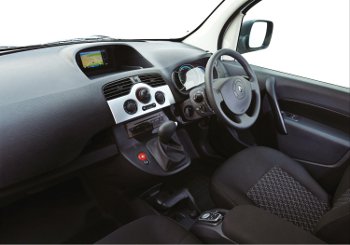
Inside the Kangoo Van Z.E. - note the automatic-style gear lever
Unlike internal combustion-engined vehicles, electric vehicles are at their most energy-efficient in built-up areas in heavy traffic, when a range of 125 miles can be achieved.
When the vehicle is at a standstill (red lights, heavy traffic, etc.), the electric motor doesn’t use any energy, while the system that recovers energy under deceleration, works more frequently during city motoring because of repeated braking and stopping.
In contrast, severe weather conditions coupled with sporty driving, hilly routes and no use of the pre-heating system, can reduce the vehicle’s range to around 50 miles.
Buying A Kangoo Van Z.E.
Renault has decided to seperate vehicle and battery ownership, presumably in the hope that it will reassure potential buyers who are worried about eventual battery replacement costs.
The Kangoo Van Z.E. will be priced from £16,990 +VAT and battery rental will cost from £60 per month (+VAT). This price is for a battery contract of 36 months or more with a mileage of 6,000 miles per year. Higher mileages or shorter contracts will cost more – up to a maximum of £105 per month + VAT for a 1 year/15,000 miles contract, at the time of writing. For comparison, prices for the standard Kangoo start from about £11,500 +VAT.
The battery hire also includes 24/7 breakdown cover, including towing to the nearest charging point (within 50 miles) if you run out of battery power.
So far, Renault has appointed twenty Z.E. (Zero Emission) dealers in the UK – at present, only these will sell Z.E. vehicles, but all Renault dealers will be able to perform non-specialist maintenance. The Z.E. vans will come with 3 year/100,000 miles warranties, just like standard vans.
Charging Facilities
Charging the Kangoo Van Z.E. from a 13A supply will take 6-8 hours – more powerful sockets can be used for a faster charge if they are available.
Renault have partnered with British Gas to supply and fit Chargemaster charging systems for Z.E. customers at either their home or office premises.
Interestingly, Renault say that they will offer van rental of internal combustion-engined vans at preferential rates to Z.E. van owners so that they can undertake longer journeys where charging facililties are not available.
Find out more at www.renault-ze.com.
Update 28/10/2011: Renault has just announced that it has received orders for 15,000 Kangoo Van Z.E. over the next four years. The biggest order by far – 10,000 vans – comes from La Poste, the French postal service. The remaining orders come from large French companies and public sector organisations.
French motor manufacturers have a long history of enjoying support from French public sector organisations and large French companies. The French like buying French cars, vans and lorries – the same is true with German manufacturers in Germany. Perhaps the UK should pursue a policy of buying British-made vehicles, too – although the manufacturers are no longer British, plenty of cars and vans are made in British factories – more than most people realise.


